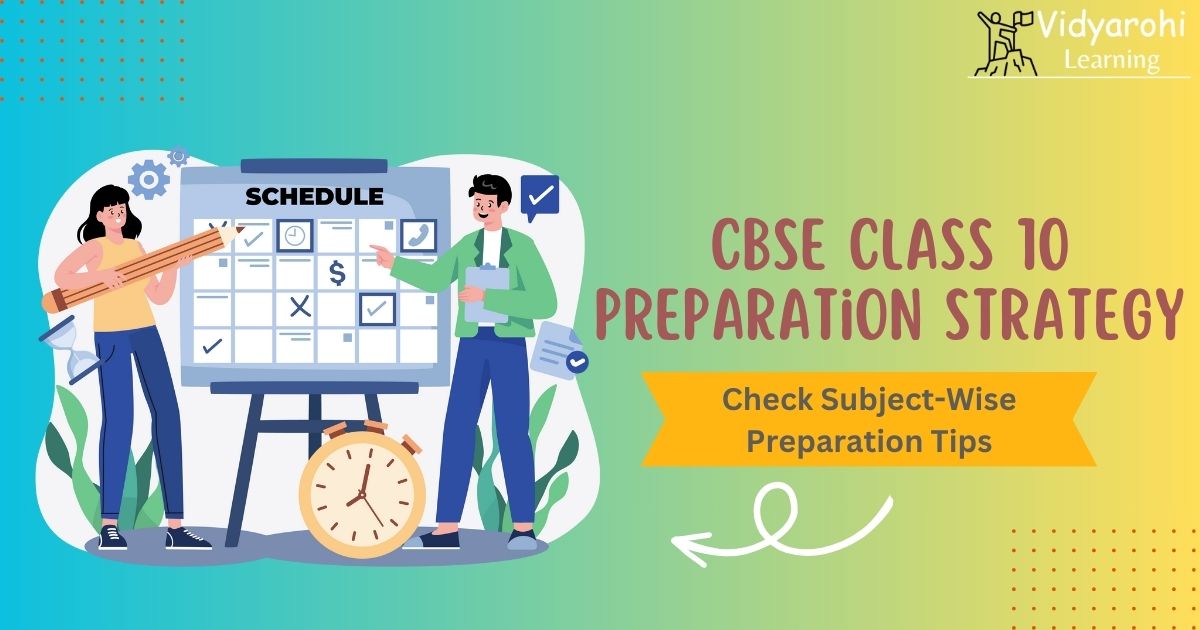CBSE Class 10 Preparation Strategy: Class 10 is one of the most important stages in a student’s academic life because the board exam results have a direct impact on future studies and career choices. Whether you want to pursue science, commerce, or humanities, your performance in Class 10 sets the foundation for it, even for some entrance exams like JEE, NEET and NDA. However, the Class 10 syllabus is quite vast, and many students feel confused or stressed about how to complete it on time. The key to success in the board exam lies in following a smart preparation strategy that combines proper planning, regular practice, and effective time management. Instead of just studying harder, students need to study smarter by focusing on important topics, solving sample papers, and revising regularly. With the right approach, it becomes much easier to cover the syllabus, reduce exam stress, and score well in the final board exams. In this article, we will share a detailed CBSE Class 10 Preparation Strategy for 2025 board exams, including subject-wise study tips, revision techniques, and expert guidance. These strategies will help students stay organised, boost their confidence, and perform their best on exam day.
Tips to Score Good Marks in CBSE Class 10 Board Exams
Scoring good marks in the CBSE Class 10 Board Exams 2026 is not just about studying for long hours but about preparing smartly and strategically. To score 90+ marks in the Class 10th Board Exam, students need a well-structured study routine that balances all subjects, includes regular practice, and allows timely revisions. A planned preparation strategy helps students complete the syllabus efficiently while ensuring effective revision before the exams. With smart study techniques, discipline, and confidence, achieving top scores in the CBSE Class 10 Board Exams 2025 becomes entirely possible.
- The first step is to focus on NCERT books, as most questions in the board exam are based on them.
- Solving sample papers and previous years’ papers helps in understanding the exam pattern, improving speed, and learning the right way to write answers.
- Consistent revision is equally important to retain concepts and avoid last-minute confusion.
- Apart from academics, students must also manage their time wisely, stay confident, and remain calm during the exam.
CBSE 10th Preparation Tips for Board Exam 2026
A well-structured Class 10 study plan can give students an edge over others and significantly increase their chances of scoring high marks in the board exams. Having a proper timetable helps you manage time effectively, cover the vast syllabus on time, and balance all subjects without feeling stressed. Before creating a complete study plan for the Class 10 exams, students should first keep some important points in mind. These include knowing the syllabus thoroughly, understanding the exam pattern, setting realistic daily goals, and giving enough time for revision and practice. By keeping these things in focus, students can prepare more smartly and perform their best in the final exam.
- Know the syllabus: Start with a clear understanding of the CBSE syllabus and unit-wise weightage for each subject. Check the Class 10 subject-wise Mathematics Syllabus and Science Syllabus.
- Understand the exam pattern: After becoming familiar with the subject-wise syllabus, go through the exam pattern to understand the types of questions likely to be asked and the paper’s marking scheme. Check CBSE Class 10 subject-wise Latest Mathematics Exam Pattern and Science Exam Pattern.
- Create a realistic timetable: Divide your daily study hours effectively, giving more time to tough or high-weightage chapters.
- Focus on NCERT books: NCERT textbooks are the backbone of board exam preparation. Read every line carefully, as most questions are directly or indirectly based on them.
- Choose the right Study material: Apart from NCERT books, choose the right study material to increase your chances of scoring good marks. Vidyarohi CBSE Class 10 Study Material will help you in this. Check Vidyarohi CBSE Class 10 Complete Study Material including Syllabus, Sample Papers, Chapter-Wise Questions, Case Study Questions, Assertion Reason Questions & More.
- Practice sample papers & PYQs: Solve CBSE sample papers and previous year question papers to improve time management and accuracy. Check CBSE Class 10 Subject-wise Previous Year Questions Paper with Solution (Mathematics and Science) provided by Vidyarohi Learning.
- Write answers in proper format: Learn the marking scheme and practice writing crisp, well-structured answers.
- Regular revision: Revise topics weekly to avoid last-minute stress.
- Stay healthy & confident: Balanced diet, proper sleep, and a calm mind are equally important for success.
CBSE Class 10 Subject-Wise Preparation Strategy
Every subject in the Class 10 board exam requires a different approach and preparation style. For example, the way you study for Mathematics is not the same as how you prepare for Biology, Physics, or English. That’s why, while making a complete study plan for the board exams, students must keep the specific requirements of each subject in mind. This ensures that you focus on the right areas, use the correct resources, and give enough time to both theory and practice. To make it easier for students, the following table provides subject-wise Class 10 preparation tips that will help in planning smarter and performing better in the exams.
| Subject | Preparation Tips |
| CBSE Class 10 Mathematics Preparation Strategy |
|
| CBSE Class 10 Science Preparation Strategy |
|
| CBSE Class 10 Social Science Preparation Strategy |
|
| CBSE Class 10 English Preparation Strategy |
|
CBSE Class 10 Study Plan
Every student has their own strengths and weaknesses, which means the study approach cannot be the same for everyone. Some students may find Mathematics easy but struggle with English, while others may be good at Science but need more time for Social Science. That is why it is very important to create a personalised study plan and timetable. A well-structured timetable helps in giving the right amount of time to each subject, based on your comfort level and preparation needs. It also ensures a proper balance between study, revision, and practice. To make this process easier, we are sharing some useful tips that will help Class 10 students design a smart and effective timetable for their board exam preparation.
- Aim to study for 6-8 hours every day with full focus.
- Divide your day into different study sessions instead of trying to study everything in one go.
- Study one subject for 2 hours at a time.
- Take a 10-15 minute break to relax before moving to the next subject. This helps improve concentration and prevents mental fatigue.
- Set a goal to complete at least one chapter per subject every week.
- Keep track of your progress using a checklist or planner.
- Ensure that you revise previously completed chapters while starting new ones. You can keep Sunday only for revision and practice, and then begin a new chapter from Monday onwards.
- Solve Vidyarohi’s chapter-wise board questions, carefully review your mistakes, and focus on improving those weak areas.
CBSE Class 10 Study Time Table Weekly
Here we are providing a sample Class 10 study timetable to help students in their preparation. This timetable is designed to give you a balanced routine for all subjects, including time for learning new chapters and revising old ones. You can use it as a reference and make small adjustments according to your own needs, weak areas, and daily schedule. Following a planned timetable like this will help you stay consistent, manage your time better, and prepare more effectively for the Class 10 board exams.
| Time | Mon | Tue | Wed | Thu | Fri | Sat |
| 4:30 AM | Wake up & get fresh | Wake up & get fresh | Wake up & get fresh | Wake up & get fresh | Wake up & get fresh | Wake up & get fresh |
| 5-7 AM | Science | Science | Science | Science | Science | Science |
| 4:30-6:30 PM | Maths | Maths | Maths | Maths | Maths | Maths |
| 6:30-6:45 PM | Break | Break | Break | Break | Break | Break |
| 6:45-8:45 PM | English | English | English | English | English | English |
| 8:45-9:15 PM | Dinner | Dinner | Dinner | Dinner | Dinner | Dinner |
| 9:15-10:15 PM | Hindi/SST | Hindi/SST | Hindi/SST | Hindi/SST | Hindi/SST | Hindi/SST |
| 10:30 PM | Sleep | Sleep | Sleep | Sleep | Sleep | Sleep |
Use Sundays only for revision & practice- no new chapters.


